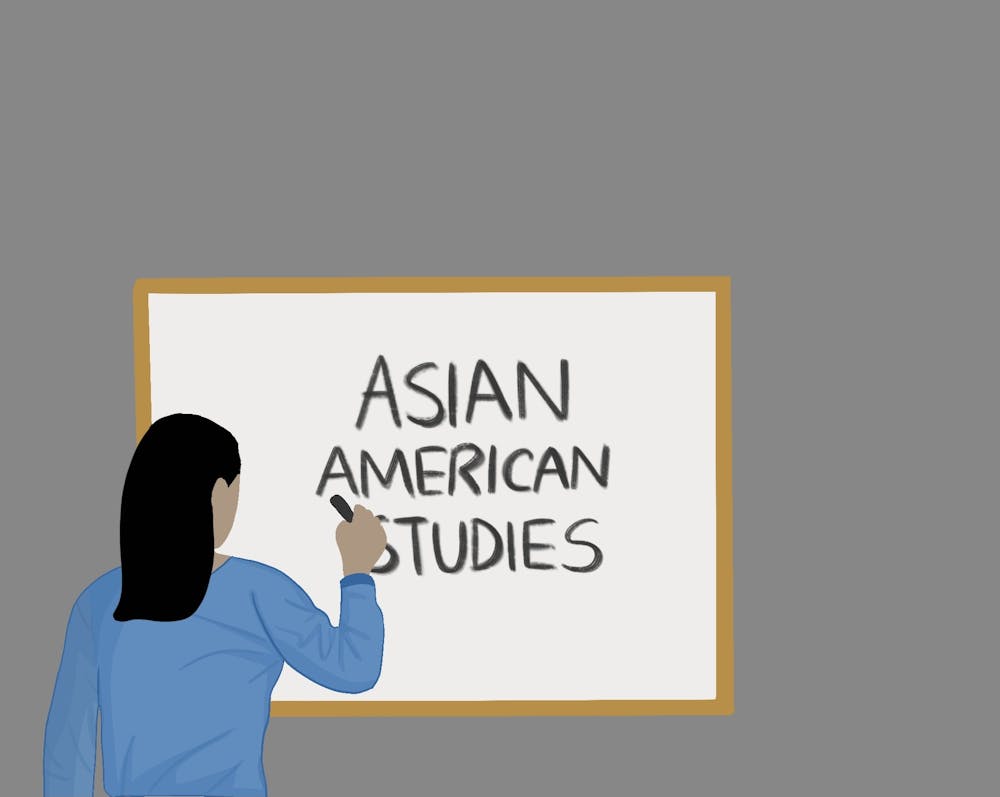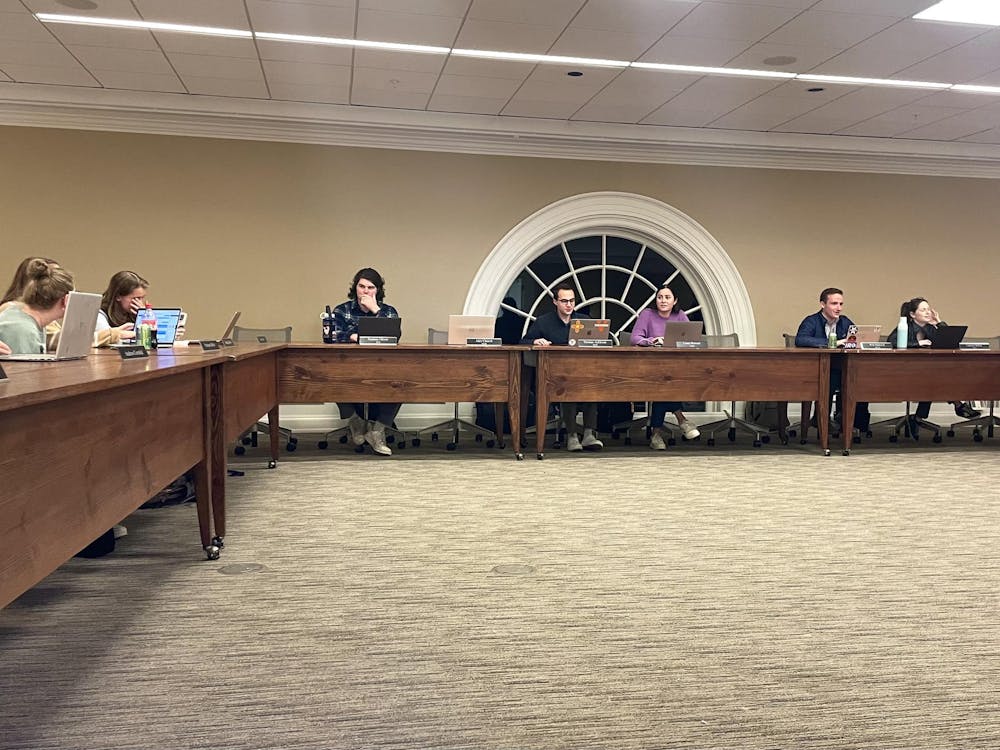中文版请点击此处
Many students of Asian descent are questioning University support as they explore identity and history in an academic environment that they say disregards Asian American Studies. Students and faculty are pushing for more courses and faculty devoted to Asian American Studies — as of today, the Asian American studies minor includes one professor and just one directly relevant class.
As of last fall, 2,758 students — approximately 15.9 percent of undergraduate students — identify as Asian American, Native Hawaiian or Pacific Islander. 11.8 percent of University faculty — 384 individuals — reported as identifying in those groups.
The Asian Pacific American Studies minor was first approved in 2004 — 10 years after Asian Student Union efforts began in 1994 with the publication of their Five Year Plan, which addressed academic coursework, faculty, relations with University administration and the formation Asian American groups, among other topics.
Two Asian American Studies professors were hired to kickstart the minor, which resides today in the Department of American Studies in relative obscurity. Only one professor, Assoc. English Prof. Sylvia Chong, remains. Chong has directed and managed the minor — which graduates anywhere from one to four students every year — alone for 14 years.
The Asian Student Union’s 2020 Asian Pacific Islander Desi American Student survey reported that out of 890 APIDA-identifying respondents, 80 percent had not heard of the APAS minor.
“That minor has been running on fumes since 2006,” Chong said.
Only one class in the minor is directly related to Asian American studies — Intro to Asian American Studies, which Chong usually teaches. Without interested and qualified faculty in previous years, Chong has had to remove the course offering entirely while on leave. Before the reintroduction of the class last spring, the class was unavailable for five semesters.
The minor also requires a comparative or race theory class, a class on modern Asia and three electives.
Intro to Asian American Studies covers Asian American history beginning with Chinese migrants in the 19th century up to present day events and issues, including the model minority myth that emerged during the Cold War era. The myth erases Asian and Asian American individuality under the false narrative that these groups are high achieving by nature. Such harmful stereotypes serve to drive a wedge between Asian Americans and other ethnic minorities, according to Karen Huang, an English doctoral candidate teaching the class during Chong’s leave.
“The waves of migration of Asian Americans that have occurred throughout history and the way that these groups of Asian Americans have subsequently been treated is really important because it speaks to the larger themes of history of oppression and of capitalist interests,” Huang said.
Intro to Asian American Studies has been popular among students, regularly reaching its full capacity of anywhere from 25 to 60 students. Fourth-year College student Jasmine Mao, a student in the minor, took the class their first year and said they credit it for their political and personal growth at the University.
“I always get really emotional thinking about how lucky I got getting into this class,” Mao said. “It’s kind of dramatic to say, but I do feel like this class changed my life.”
Fourth-year College student Andrea Dilao joined the minor last year after taking Intro to Asian American Studies. Dilao said she found the class — whose curriculum dedicates one week to Filipino Americans — and the minor critical to fortifying her ongoing reflection of her Filipino American identity.
“It was so important to me to be able to synthesize the last three years that I've been doing kind of my own personal … introspection and reflection on what it is to be a member of a really diverse … Asian American diaspora,” Dilao said.
Similarly, third-year College student Heather Moser said they were enlightened by the diverse perspectives introduced in the course, which expanded beyond what they had learned in the East Asian Studies major. Moser’s favorite unit delved into Hawaiian history, incorporating many texts written by native Hawaiians.
“My biggest goal, my own personal one, for doing the minor was to explore Asian identities beyond the East Asian narrative,” Moser said.
Moser is currently taking an African American Studies course this semester for the minor’s comparative requirement, which requires students to gain perspective through other racial studies as well.
Huang has heard from students of Asian descent that they have found comfort and identification in Intro to Asian American Studies. Students of other ethnic backgrounds have also been drawn to the class out of curiosity, she added, looking to fill in gaps of Asian American history missing from high school history classes.
“I think a lot of what I experience is not by virtue of being Asian in an essentialist sense, but being seen as Asian and what that means … on an everyday level,” Huang said.
Although Intro to Asian American Studies and the APAS minor have received love from students, the lack of additional Asian American Studies courses and University support has garnered criticism from students and faculty.
“If U.Va. wants to claim to be both great and good, supporting its Asian American population through [the] bolstering of academia in Asian American history and experience is one way they have to go,” Dilao said.
William & Mary, the University of Michigan, University of California, Berkeley and University of North Carolina, Chapel Hill all have larger Asian American Studies programs than the University, supporting both a larger number of faculty and courses.
Over the years, students have repeatedly called to improve Asian American Studies at the University.
Asian Leaders Council’s 2018 report demanded the creation of a Department of American Studies to house and support both the APAS and Latinx Studies minors. Mao, who helped write the report, said they found shocking similarities between present-day demands and those from ASU’s Five Year Plan almost 30 years ago, including calls for more faculty of color and non-Western classes. Both reports highlight the urgency of actively working to eliminate APIDA discrimination at the University. While the Five Year Plan did not explicitly ask for a department, the 2018 report details the benefits of having one.
Chong emphasized the administrative power a department has in controlling its hiring processes because it can employ faculty without the convoluted political process of hiring with other departments, as major and minor programs without an overreaching department must do. The Department of American Studies — established in fall 2020 — is capable of producing the Asian American Studies courses and faculty APIDA students lack, Chong said.
“It's a push that needed to happen for a long time,” said Serena Wood, third-year College student and co-chair of the ALC. “I'm happy that they were able to finally ... hear it after we compiled this report and actually listened.”
Although the creation of the department is a step forward, Vilas Annavarapu — Class of 2020 alumnus who served as chair of the ALC when the 2018 report was published — expressed disappointment with the University for falling short of expectations after promising talks about expanding Asian American and Latinx studies with officials like Ian Baucom, dean of the College.
“In spite of verbal commitments ... the vision of the report has not been actualized,” Annavarapu said in an email to The Cavalier Daily. “U.Va. has a long tradition of delaying and deferring — one need only look at the Living Wage Campaign as evidence of the hard work of activists falling on deaf ears. I hope that U.Va. — especially given the work of the Racial Equity Task Force — meaningfully commits to academic reform and ethnic studies.”
Following the report’s release, ALC and the Latinx Student Alliance held a symposium in 2019 during which students, faculty and administrators discussed the future of ethnic studies. Though students responded positively, Mao — who helped organize the symposium — noticed little change afterwards.
“In terms of awareness [and] energy behind the fight for ethnic studies, I have to admit that I don’t feel like much has changed among students,” Mao said in a statement.
Today, Mao still finds ethnic studies lacking.
“The [APAS] minor is bare,” Mao said. “The minor is nominal in nature because of the way U.Va. does not support its ethnic studies programs or its attempts at ethnic studies programs.”
ASU, which signed the ALC report in solidarity, also champions more faculty as part of their mission to empower the APIDAS community in Charlottesville.
“We simply want more faculty who are knowledgeable about Asian American relations,” said Valerie Young, former ASU president and fourth-year College student. “We want students to be more engaged in the history of how Asian Americans came to America and had movements beforehand.”
Since the creation of the Department of American Studies, only one new full-time member has been hired — Professor Lisa Marie Cacho, who specializes in Latinx Studies. In a normal year, Chong said following up with a hire in Asian American Studies would be possible — major events in the past year have changed the University’s plans, however. Specifically, Chong said she wants to hire an Asian American historian.
“So many universities in the country anchor their Asian American Studies programs around a historian because that’s such an important topic,” Chong said. “We have zero. I’m a fill-in professor who teaches a history class because no one is around to do it.”
Recent events, including the COVID-19 pandemic, have reduced funding for faculty employment — according to an internal email obtained by The Cavalier Daily, Baucom has informed College faculty and staff of the University's intention to focus its resources on hiring faculty in nine positions related to African and African American Studies as part of the University’s Race, Justice and Equity initiative. Five of these nine positions will be filled as soon as possible, and the search for the remaining four faculty will take place in fall 2021.
Although Chong supports hiring experts in these underrepresented fields, she questioned the lack of Asian American and Latinx representation in the initiative.
“They are sending out a message that ... APIDA people are not a race, have no issues of injustice and inequity,” she said. “They're pitting racial groups against each other. And this is particularly galling to me in a time of COVID, discrimination and racial paranoia.”
Christian McMillen, associate dean of social sciences for the College of Arts and Sciences, said that the University’s Race, Justice and Equity initiative focuses on hiring Black studies faculty. Due to the financial impact of COVID, he said, hiring has largely been funded by outside grants.
“Arts & Sciences leadership has met with the faculty about the need and the importance for Asian American scholars and bringing this focus into American Studies — we’re acutely aware of the need and have identified it as a priority area,” McMillen said in an email statement. “We remain committed to hiring faculty working on a broad range of questions focused on race and ethnicity over the coming years.”
Outside academics, students have also looked for APIDA community and empowerment through local organizations. Dilao is a member of the Organization of Young Filipino Americans and the Asian Pacific American Leadership Training Institute, Moser is part of the Japanese American Citizens League based in Northern Virginia and Mao works with Asians Revolutionizing Together at the University. Additionally, ALC is currently working on compiling a history of Asian Americans at the University with the hopes of collaborating with University Guides to create an oral history tour, according to Wood.
As the push for an improved Asian American Studies program continues, Dilao recommends taking advantage of existing Asian American Studies resources — such as the introductory course and Asian American student organizations — to demonstrate support. She hopes more students will join the APAS minor.
“It is a numerical way to show the University that it’s necessary, that it is essential to the academic and personal experience of U.Va. students,” she said.





